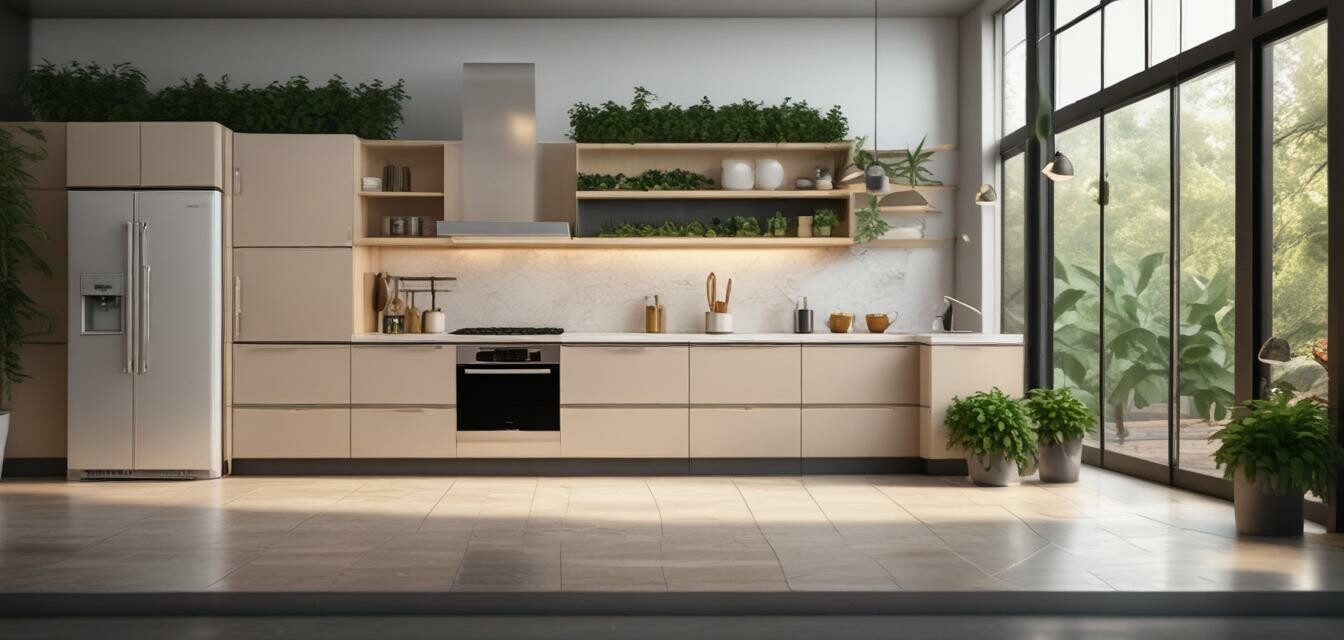
Trends in kitchen sustainability for 2025
- Increased focus on energy-efficient appliances to reduce carbon footprints.
- The rise of smart technology that promotes sustainable cooking practices.
- Growing popularity of composting and waste-reduction techniques in the kitchen.
- Integration of sustainable materials and practices in kitchen design.
- Enhanced consumer awareness of eco-friendly product certifications.
As we move towards 2025, sustainability in the kitchen is becoming more critical than ever. With the ongoing concerns about climate change and the need for environmentally friendly practices, homeowners are increasingly looking to smart technology and innovative appliances. This article will explore the latest trends in kitchen sustainability for the upcoming year, focusing on eco-friendly appliances and practices that not only promote a healthier planet but also reduce waste.
1. Energy-Efficient Appliances
Energy-efficient appliances are at the forefront of sustainable kitchen trends. Homeowners are opting for devices that consume less electricity while still maintaining high performance. These appliances can significantly reduce energy bills and lower greenhouse gas emissions.
| Appliance Type | Energy Savings (%) | Environmental Benefits |
|---|---|---|
| Refrigerators | 20-30% | Less energy consumption leads to reduced carbon footprint. |
| Dishwashers | 15-25% | Efficient water usage helps preserve this vital resource. |
| Ovens | 10-20% | Quicker cooking times improve overall energy efficiency. |
2. Smart Kitchen Technology
Smart kitchens are revolutionizing how we cook and manage our food. Technology like IoT-enabled appliances helps minimize waste by providing real-time data about food expiration dates and efficient cooking methods. Smart ovens and Bluetooth-enabled devices allow users to monitor and manage cooking processes remotely.
Bluetooth-enabled devices are particularly notable, as they provide a convenient way to ensure that you are using your kitchen appliances efficiently, enhancing both sustainability and convenience.
3. Composting and Waste Reduction
More homeowners are becoming environmentally conscious and are implementing composting methods in their kitchens. Composting organic waste not only reduces landfill contributions but also produces nutrient-rich soil for gardens.
Benefits of Composting
- Reduces methane emissions from landfills.
- Cuts down on kitchen waste disposal costs.
- Enhances soil health and promotes plant growth.
- Encourages sustainable gardening practices.
4. Sustainable Kitchen Design
Homeowners are also focusing on sustainable materials during kitchen renovations and new builds. Options like bamboo cabinets, recycled countertops, and eco-friendly finishes are gaining popularity. This not only reduces the environmental impact of manufacturing but also provides a beautiful aesthetic appeal.
Materials to Consider
- Bamboo – A rapidly renewable resource.
- Reclaimed wood – Reduces the need for new lumber.
- Recycled glass and metal – Reduces waste and promotes circular economy.
5. Eco-Friendly Certifications
As consumer awareness of sustainable products increases, manufacturers are responding by obtaining eco-friendly certifications. Products that come with certifications such as ENERGY STAR or Green Seal are often preferred when making purchasing decisions. This trend reflects a growing desire for transparency regarding sustainability claims in the market.
Popular Eco-Friendly Certifications
- ENERGY STAR: Signifies energy efficiency standards.
- Green Seal: Identifies non-toxic and environmentally safe products.
- Forest Stewardship Council (FSC): Promotes responsible forest management.
Tips for a Sustainable Kitchen
- Invest in energy-efficient appliances and smart technology.
- Start a compost bin to manage organic waste effectively.
- Choose sustainable materials during renovations.
- Stay informed on eco-friendly certifications when shopping.
- Plan meals to minimize food waste and utilize leftovers creatively.
Pros
- Lower energy and water bills.
- Reduced environmental impact.
- Promotes healthy cooking habits.
- Increased home value with sustainable projects.
Cons
- Higher upfront cost for eco-friendly appliances.
- May require time to learn new smart technologies.
- Composting maintenance can be demanding.
Conclusion
The evolution of kitchen sustainability will continue to develop through 2025 and beyond. By adopting energy-efficient appliances, utilizing smart technology, composting, and embracing sustainable practices and materials, homeowners can create a kitchen that is not only modern but also eco-friendly. Staying informed about these trends enables consumers to make educated choices, ultimately leading to a more sustainable future.
For more information about eco-friendly innovations, check out our Smart Kitchen Tips section for additional resources.